81% of Iranian internet users bypass censorship with VPNs - Parliament

A recent survey by the Iranian Parliament Research Center indicates that the vast majority of Iranians (81%) rely on VPNs to bypass internet censorship.

A recent survey by the Iranian Parliament Research Center indicates that the vast majority of Iranians (81%) rely on VPNs to bypass internet censorship.
The survey, based on telephone interviews with 1,100 participants in December 2024, indicates that 49.4% of VPN users rely on free services, while 30.3% opt for paid alternatives. Only 18.9% of respondents reported not using a VPN.
The survey also shed light on public sentiment regarding potential changes to internet restrictions under President Masoud Pezeshkian.
A significant 24.8% of participants expressed "no hope at all" for the lifting of filtering and social restrictions. An additional26.7% indicated"low" hope. In contrast, 20.5% expressed "high" hope, and 11.2% "very high" hope. 16.8% either did not answer or responded"don't know."
Lifting internet filtering was one of Pezeshkian’s main campaign promises in the presidential election in 2024.
He had said, "I would put my neck on the line to solve the filtering issue."

Dr. Kylie Moore-Gilbert, a researcher and former prisoner in Iran, has criticized Australian Senator Fatima Payman for defending Iran’s treatment of women in an interview with the state-run Press TV.
In a post on X, Moore-Gilbert called Payman’s remarks “nonsense,” rejecting the senator’s claim that Iran allows women to participate in democracy.
She pointed out that Payman had previously attended a Senate inquiry into Iran’s human rights abuses and questioned why she would agree to speak with Press TV.
“The English-language propaganda arm of the Islamic Republic [is] known for broadcasting false confession videos and forced interviews with prisoners before they are executed," she said.
“The irony of a strong and powerful woman originally from Afghanistan… denying that her Iranian sisters face similar challenges just next door,” Moore-Gilbert wrote, adding that Payman’s stance contradicts her past expressions of solidarity with Iranian protesters.
Payman’s interview, in which she accused Western media of biased coverage on Iran, has sparked backlash, with critics arguing that her comments downplay the Islamic Republic’s record on women’s rights.

A new high-tech public art display at a Tehran metro station aimed at cajoling women into wearing hijabs has been met with scorn by some Iranians describing the immersive exhibit as a state-backed "repentance room."
A video showcasing the interactive installation at Tajrish station established by the Tehran municipality and run by the Daughters of the Revolution group aired on state television Tuesday.
The group, known for promoting an Islamic lifestyle and championing the Islamic veil is headed by Bahareh Jangravi, who said the project was a means of spreading the importance of wearing the hijab, in the wake of a national mass rebellion against the Islamic Republic's mandatory dress code.
The video shows women whose attire violates hijab rules weeping in the room. They are then offered headscarves by metro officials and encouraged to comply with the theocracy's strict regulations.
Concerns have also been raised on social media platforms about the authenticity of the video, with some suggesting that the women depicted either paid actors or women acting under duress.
Jangravi explained that her group's name, "Daughters of the Revolution," was chosen in response to the "Girls of Enghelab (Revolution) Street" movement, a wave of symbolic protests against mandatory hijab inspired by activist Vida Movahed's 2017 public act of defiance.
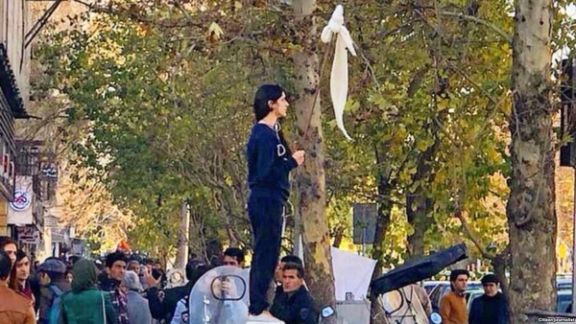
The interactive installation also features images of slain Islamic Revolutionary Guard Corps commanders and other figures revered by the Islamic Republic.
They include the slain commander of the IRGC foreign operations arm Qassem Soleimani and Hamas leader Yahya Sinwar. The two figures revered by Iran's military-clerical establishment were killed by the United States and Israel, respectively.
The exhibit is a scaled model of the shrine of Imam Husayn ibn Ali, the third Shia Muslim Imam. Through VR goggles, visitors can explore a lifelike virtual rendering of the actual shrine and its surroundings in Karbala, Iraq.
The initiative has drawn widespread criticism, with many viewing the room as an inappropriate use of public space to enforce the government's ideological agenda.
Critics question the municipality's involvement, arguing it oversteps its mandate and diverts resources from pressing urban issues.
Similar controversies have surrounded previous actions by the municipality, such as the deployment of "hijab guards" in metro stations and the burial of "unknown martyrs" at universities and recreational sites, along with the construction of mosques in parks.
The controversy highlights the ongoing struggle over hijab enforcement in Iran since the nationwide Woman Life Freedom protest movement following the death of 22-year-old Mahsa Amini in the custody of morality police in September 2022.
A large number of women in Tehran and other major cities continue to defy the mandatory hijab, a trend that began with the 2022 protests.
The widespread non-compliance has strained police enforcement efforts, prompting the government to explore alternative methods, including a controversial new bill that emphasizes fines, deprivation of public services and the so-called cultural initiatives over direct confrontation.
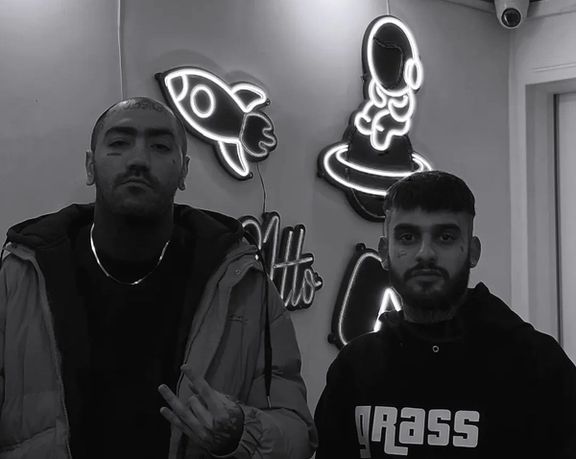
Security forces arrested Iranian rapper Arash Seyedi, known as Eycin and his producer Rasam Sohrabi during a live underground performance at a cafe in western Tehran on Thursday, eyewitnesses told Iran International.
“He had a performance at a café in western Tehran in Janatabad when plainclothes officers and the police arrived, arrested him and his composer, and detained several people there,” one source said, requesting to remain anonymous for security reasons.
A video obtained by Iran International shows the moment the officers storm the venue and detain the underground rapper. A masked man can be seen in the footage, who the source said was one of those who detained Eycin.
“They came with a van and took everyone away. The venue was also sealed off,” the source added, "Eycin had scheduled several performances in cafes, on a tour, in Qeshm in recent weeks."
The fans were later released but two sources told Iran International that Eycin and his composer remained in detention.
A source said that both Eysin and Sohrabi appeared in court on Friday morning, however the charges against them remain unknown.
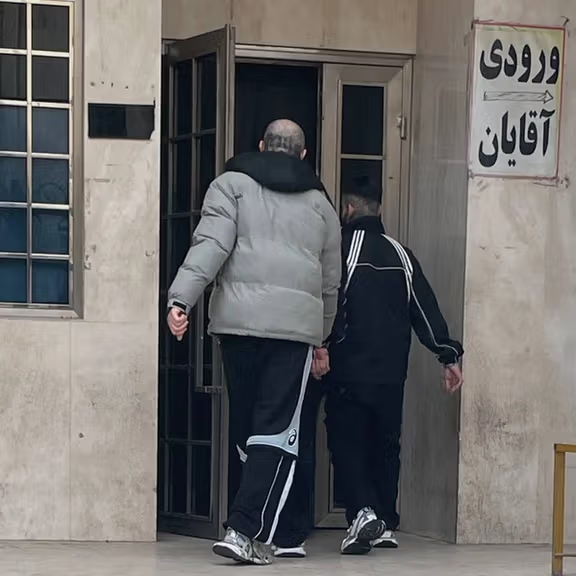
“Lately, rappers have been organizing a lot of underground performances through various methods. It seems like they want to crack down before it spreads,” the source said.
International human rights organizations have condemned Iran's suppression of artistic expression in recent years.
In the aftermath of Iran's nationwide protests sparked by the death in custody of Mahsa Amini in September 2022, at least two rappers - Toomaj Salehi and Saman Yasin - were sentenced to death in connection with their music. Following an international outcry, their death sentences were revoked.
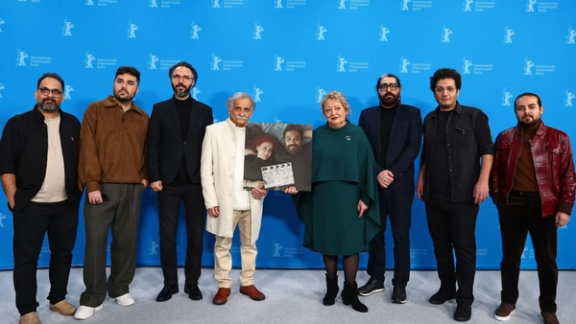
Hundreds of prominent filmmakers including top global celebrities have signed an open letter demanding Iranian authorities drop propaganda and obscenity charges against the two directors of recent film "My Favorite Cake".
The independent film about a widow's quest for companionship defied strict censorship laws in Iran to gain international acclaim, sparking outcry over the persecution of its creators.
The petition launched on Change.org calls for the immediate and unconditional dismissal of charges against the two filmmakers Maryam Moghaddam and Behtash Sanaeeha, who face trial in Tehran’s revolutionary court on March 1.
The charges include propaganda against the system, producing and distributing a film with obscene content, violating public morality and decency, and screening the film without a distribution license.
The petition has garnered widespread support from the global film community, with signatories including Pedro Almodóvar, Juliette Binoche, Jean-Pierre Dardenne, Jafar Panahi, Mohammad Rasoulof, Agnieszka Holland, Joachim Trier, Céline Sciamma, Arthur Harari, Dominik Moll and the directors of the Venice, Berlin, and Rotterdam film festivals.
The statement signed by the filmmakers condemns the prosecution of Moghaddam and Sanaeeha, describing it as part of a broader crackdown on artistic expression in Iran.
It highlights that the directors have faced "months of interrogation and two years of continuous travel bans" for making the film, which portrays the life of a middle-aged woman in Tehran struggling with loneliness and societal expectations.
The film, which received critical acclaim internationally, screened in competition at the 2023 Berlin Film Festival, winning the FIPRESCI Jury Award, and later received the Silver Hugo at the Chicago Film Festival.
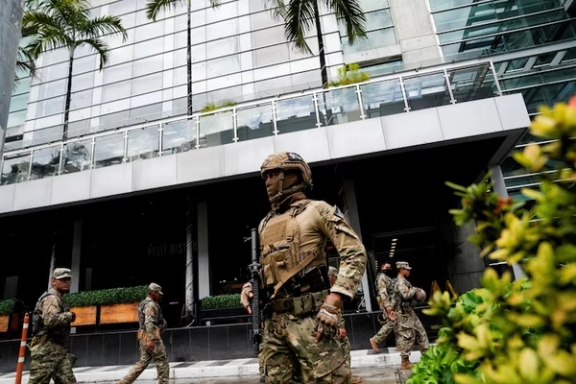
Dozens of Iranians were among nearly 100 migrants transferred Tuesday night to a detention camp deep in the Panamanian jungle, The New York Times reported.
Deported by the United States under an agreement with Panama, the group had been held in a locked hotel before being moved by bus to the Darién province, an area known for its harsh conditions.
“It looks like a zoo, there are fenced cages,” said Artemis Ghasemzadeh, a 27-year-old Iranian migrant, after the four-hour journey from Panama City. “They gave us a stale piece of bread. We are sitting on the floor.”
The detainees include eight children, a source told The Times. Under Panamanian law, detention beyond 24 hours without a court order is illegal, but it remains unclear how long they will remain at the site. Authorities have blocked journalists and aid groups from entering, while diseases like dengue are prevalent in the area.
Panama’s deputy foreign minister, Carlos Ruiz-Hernández, confirmed the transfer, denying it was a detention facility. “It’s a migrant camp where they will be taken care of,” he said. Security Minister Frank Ábrego added that migrants were being held for their own protection while officials verified their identities.
“What we agreed with the United States government is that they remain and are in our temporary custody for their protection,” he added.
The deportation is part of a broader effort by the Trump administration to send undocumented migrants to third countries.
The US faces legal and diplomatic hurdles in returning people to nations like Iran, China, and Afghanistan but has pressured Panama into accepting some deportees. Some migrants, including Iranian Christians, fear persecution if repatriated. Under Iranian law, converting from Islam is considered apostasy, punishable by death.
On Tuesday night, Panamanian authorities told detainees to pack their bags. Buses departed the hotel under tight security, passing the airport before heading east to the jungle camp.
According to the report, one Iranian woman wept on the bus, worried for her sick child. She said her child had been sick with a sore throat for days and the uncertainty and constant displacement was taking a toll on her.
Upon arrival, officials collected fingerprints and had migrants fill out forms.
Panamanian officials say some detainees are voluntarily accepting repatriation through the International Organization for Migration. Others remain in limbo, fearing what awaits if sent back home.